Are Organic Foods Better for My Baby?
- Whether or not organic foods differ significantly in nutrition content than their non-organic or conventionally grown counterparts
- How to choose which foods to buy organic if you can't afford or get access to all organic choices
- Why organic junk food is still junk food and how Americans, in particular, equate “organic” labels with “healthier” food choices, even when that might not be the case

LISTEN TO THIS EPISODE
Episode Description
Does my baby need to eat organic foods? Are organic foods “healthier” than their conventionally grown counterparts? If you can only afford or get access to certain types of organic foods, which ones should you offer to your baby?
In this episode we’re looking at organic foods to determine if they are inherently better choices for babies than are non-organic foods. We’re analyzing the nutrition, taste, environmental impact and economic considerations of selecting or not selecting organic foods when starting solids with your baby.
Links from this Episode
- Baby-Led Weaning with Katie Ferraro program with the 100 First Foods™ Daily Meal Plan, join here: https://babyledweaning.co/program
- Baby-Led Weaning for Beginners free online workshop with 100 First Foods™ list to all attendees, register here: https://babyledweaning.co/baby-led-weaning-for-beginners
Other Episodes Related to this Topic
- Episode 76: Sustainable Meat: Smart Selections for Starting Solids with Diana Rodgers, RD is here

Latest Episodes
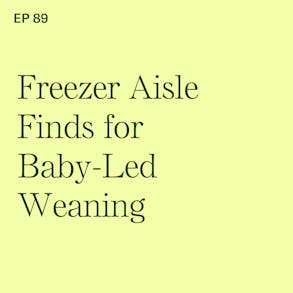
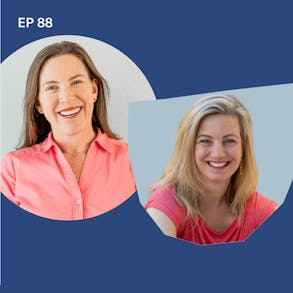
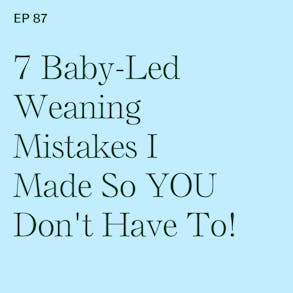
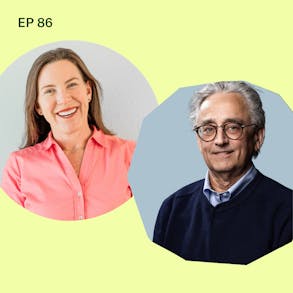
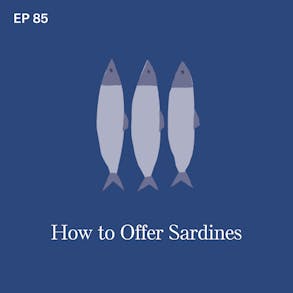
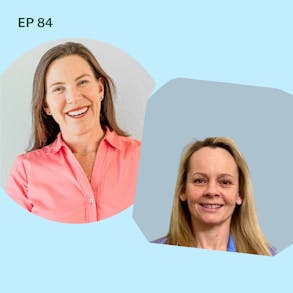
Katie Ferraro (1s):
See this you're at the store and there's strawberries, right? There's organic. And then there's regular. Non-organic strawberries and you're agonizing. Which one should my baby have? But from a nutrition standpoint, frankly, there's no more vitamin C or fiber in organic than regular strawberries. It just doesn't work like that. Hey, there I'm Katie Ferraro, registered dietician, college nutrition professor, and mom of seven specializing in baby-led weaning here on the baby-led weaning made easy podcast. I help you strip out all of the noise and nonsense about feeding, leaving you with the competence and knowledge you need to give your baby a safe start to solid foods using baby-led weaning.
Katie Ferraro (42s):
Hey guys, welcome today. We're going to be talking about what tends to be a slightly controversial topic. It's organic foods. People either like love to love organic foods or love to hate organic foods, but I'm interested in exploring whether or not they're better for your baby, now better than what you might be wondering in this regard and referring to organic versus conventionally grown foods. I.e non-organic foods like are organic foods more nutritious? Are they worth the extra cost? Does it really matter if your baby eats organic foods? If you're hitting the other important touch points, like offering a variety of foods and flavors and tastes and textures. So let's dive in and talk a little bit about whether or not these organic foods are really better for your baby when you're doing baby-led weaning.
Katie Ferraro (1m 27s):
So on these mini baby-led weaning training type of episodes, like the one I'm doing today on organic foods. I love to start out with a baby-led weaning tip of the day. And today's tip not surprisingly is about organic foods. When it comes to the nutrient content, we're talking nutrients like vitamin C or fiber or iron, please know that organic foods are not quote unquote more nutritious than are conventionally grown foods. Let's say you're at the store and you have the option for strawberries. There's organic strawberries. And there's strawberries that don't say organic. So they're conventionally grown ones and you're like, Hmm, which one should I feed my baby? When I talk to parents? There's the perception? Well, the organic ones are healthier. What do we mean by healthy? If we're talking about nutrient content, there's lots of ways to define health. But from a nutrient standpoint, let's say vitamin C, right?
Katie Ferraro (2m 8s):
We know strawberries, a vitamin C and vitamin C helps boost your baby's iron absorption. There's not more vitamin C in that organic strawberry than there is in the conventional strawberries. So across the board, we don't see appreciably more nutrient density in organic foods than we see in conventionally grown ones. And what I hate to see our parents foregoing the purchasing of, or the feeding of fresh fruits and vegetables and other wholesome foods to their baby, because they're quote unquote, not organic. We're going to talk about some of the limitations of buying organic and some of the strengths in this episode as well. But no, from a nutrient standpoint that organic foods do not have more quote, unquote nutrition. They undo conventionally grown ones. It just doesn't work like that. But hang tight because again, going to get to the benefits of feeding your baby organic foods, there are certainly out there, but I don't want you to feel bad.
Katie Ferraro (2m 50s):
If when you go to the store, you buy the regular strawberries. Before we get into the benefits or the drawbacks of organic, let's just first define it because it can be super confusing depending where you live in the world. Even if where you live in the United States, there's different certifications that you can have in the United States. We tend to see the largest one. If you want to be a certified organic food with carry the USDA organic label, you have to pass these USDA. And that's our department of agriculture inspections, every step of production, right from the seed, that's put into the ground, to the making of the compost for the fertilizer, to the manufacturer and the labeling of the final product. So there's all sorts. I actually, I don't know if you guys noticed, but I teach college nutrition, taught it for like almost 20 years at this point.
Katie Ferraro (3m 31s):
And I love teaching about organic foods. Cause I think it's the area that gets so confusing. And we dive deep in these courses into like the nutrition labeling. And even after taking a whole course on nutrition, students are like, I'm still confused about organic labeling. So I'm not going to get into it with you, but just know that there are certain requirements. You can't just slap organic on a label and say a food is organic. Okay. Now in nutrition labeling, there are a lot of other qualifiers that are used that are sometimes not legitimate. For example, in food, the word natural essentially means nothing. Okay? Just like if you're learning from someone and they say, they're a nutritionist, I am in the state of California, a registered dietician. The term nutritionist means nothing. Anyone can walk around calling themselves a nutritionist. When we talk about natural foods, natural doesn't really mean anything, at least in the United States, as it pertains to food labeling.
Katie Ferraro (4m 16s):
But people throw that term around organic. There definitely are definitions, but just know that it can be kind of confusing. And if you find yourself confused about organic foods, don't worry. You're not alone because most Americans actually think that organic foods are healthier than conventional ones. There was one study from the pew research center back in 2018 that found that more than half of Americans perceive organic fruits and vegetables as being healthier than their conventionally grown produce. So if they're at the store, like you just were looking at the strawberries, they're going to buy the organic ones. And if you ask them why they're going to say more than half the time, it's because they're healthier than the other strawberries. But from a nutrient standpoint, they certainly are not now, what are some benefits of organic foods? Certainly the environmental impact, okay.
Katie Ferraro (4m 56s):
Organic farming practices, they reduce pollution. They can serve water. There's less soil erosion, more use of the soil fertility. They use less energy. There's less use of synthetic pesticides. That's better for the surrounding animals and the people who live near to those farms. We also know with organic foods, there's lower risks of creating antibiotic resistant strains of bacteria and organically raised animals have had more space to move around, which in turn helps to keep them healthy. And I'm going to be speaking mostly about organic plant foods in this episode. But if you want to learn more about sustainable meat choices, I actually did a podcast episode it's episode 76, it was sustainable eat. It was called sustainable meat, smart selections for starting solids.
Katie Ferraro (5m 38s):
And that was with Diana Rogers. Again, if you go to blwpodcast.com/76, you can find that episode there to learn more. She has a lot of opinions and thoughts about organic when it comes to animal foods. Okay. But back to the plant foods, another benefit besides the environmental impact, which is certainly important is a plant that grows organically without pesticides may have an enhanced taste. I know personally I live in California. Again. I think the tomatoes in California tastes terrible. I remember the first time as a child trying tomatoes in Pennsylvania, where my family's from, they're known for very good tasting tomatoes being like, oh, this is what a tomato is supposed to taste like, like my entire life in California ate tomatoes that were selectively bred to.
Katie Ferraro (6m 20s):
Well, look nice and cost very little money, but they were a gross texture. It didn't taste like anything. So I personally feel that certain organic foods do taste better. Apples are another one that comes to mind. I love the taste of home. Ganek apple, whereas conventional apples, at least where I am in California. Again, mealy don't taste like anything. Like don't even waste your money on them. So I'm also not alone because a different pew research study from 2016 found that 32% of Americans agreed that organic foods taste better. And about 60% said that organic and conventionally grown produce tastes the same. So talking about fruits and vegetables, so it's like the jury's kind of out, it's up to you. If you think those foods taste better and you decide you want to buy organic foods because they taste better. In addition to the environmental impact, that might certainly be another benefit.
Katie Ferraro (7m 1s):
Now, what are some of the potential drawbacks? Okay. And the first one I think that comes to mind for a lot of people is cost generally across the board. It's really hard to quantify this, but it's thought that organic foods costs somewhere between 10 to 40% more than their conventionally grown counterparts. So for people who are on a limited food dollar, they might not have the luxury to go out and buy everything all organic all the time. And you hear people throw that term around a lot. I'll hear parents talking about how their kids eat. Oh, my kids eat so well. Like they eat everything like organic, right? And I like to remind them that just because it's organic, right? The organic junk foods are still junk foods. Sometimes you're not only paying more for these foods, but they're actually less nutritious. And I'll have parents say, oh, you know this or yogurt. I like it because it has organic cane sugar in it. Sugar is sugar is sugar and your baby shouldn't be having any added sugars.
Katie Ferraro (7m 45s):
I don't care if it's organic, go to the grocery store, look at the baby food aisle, or look at the best specialty, the yogurt aisle. That one gets under my skin so bad, but you're in the yogurt aisle and you're looking at baby yogurt. Oh, it's organic. It has organic cane sugar in it. Guess what? Baby shouldn't have any added sugar from fruits or beverages until after two. And even then we really should work to minimize it. The parents will say, oh, it's organic. So it's okay. Just again, I feel like a broken record at this point. So I'll stop. But organic foods do tend to cost more so organic food supply is limited compared to demand. And organic foods are generally more expensive than our conventionally grown foods. The production costs for organic foods, certainly higher. Now, if you live in the United States, you live in a country that spends a disproportionately small amount of disposable income on food.
Katie Ferraro (8m 27s):
Go to other parts of the world. People spend a much greater percentage of what they make on food than we tend to hear because we have a very, very, very, very cheap, heavily subsidized food system in the United States. So conventionally grown foods end up being pretty cheap and the marketing and the distribution chains for organic foods, because it's just a small operation tend to be higher. So all of that contributes to increased costs. One might argue that the ecological footprint of organic foods could be considered one of the downsides. Like I know if you walk into whole foods and there's an organic mango, let's say so an organic mango grown in South America, it's organic. So one must consider the benefit. Is it worth shipping organic from halfway around the world when you could have conventionally grown X, Y, or Z that's in peak season, right?
Katie Ferraro (9m 10s):
Just down the street. So those are just some of the issues surrounding organic foods. Beyond the mere mentioned that organic foods are not significantly more nutrient dense than our they're conventionally grown counterparts. And other times when you're exploring the issues of, should I choose organic or not people oftentimes site the dirty dozen. So the dirty dozen is since 1995 and organization called the environmental working group for EWG comes up with this ranking of produce. And it's based on how quote unquote dirty. They seem basically dirty equating to high pesticide levels. And to be honest, when we're talking about health and we're talking about benefits of organic foods, people say, yeah, I get it. That the organic strawberry might not have more vitamin C than the conventional grown one, but it doesn't have, and it definitely has less pesticides.
Katie Ferraro (9m 51s):
Some parents are very conscientious about pesticides. They'll follow the dirty dozen saying, okay, these are the 12 dirtiest foods I'm going to choose those organic. When I can, there has been in the nutrition and feeding worlds, definitely some pushback against this dirty dozen over the last few years, seeing that it is not a scientifically supported approach to ranking foods, it tends to negatively impact consumers. Cause it, it discourages them from buying the produce that they perceive as being dirty. So don't take the dirty dozen as like the Bible. Okay. It might have some beneficial suggestions, but if you start to look at the source data about what the actual pesticide levels are, many would argue that they're not considered problematic.
Katie Ferraro (10m 31s):
And again, that's a decision you might have to make for your own family. Some families are like, Hey, when in doubt, leave it out. I'm going to buy organic for everyone. But I always think of like an organic banana and I don't know exactly where banana falls on the dirty dozen list this year. But one of the reasons why I would buy organic is to potentially reduce the impact of pesticides or the pesticide residue levels on the food I was gonna eat. If I'm gonna feed a banana to my baby, they're not eating the banana peel. Right? You move the part that potentially came into contact with the pesticides, the appeal, and you feed your baby. The flesh on the inside. Sorry, I have seven kids and we'd go through 50 bananas a week. So I'm not going to buy organic bananas. Cause they cost me it's as much on the other side, I see a lot of you guys cutting bananas in half and keeping the peel on it and then handing it to your baby. Some people call it like a banana lipstick and the baby is like licking.
Katie Ferraro (11m 15s):
And just getting deep in the banana peel. We'll feed babies, banana peels. I don't like the banana lipstick because if it's an organic banana who knows where that banana peel has been and you probably didn't wash it. And also you can teach your baby how to eat a banana without the peel on, because that's how you eat a banana. So sorry for the soapbox there. I personally buy organic apples. I don't buy organic bananas. That's my decision. And you are more than welcome to make your decision for your own family. All right. So what foods should you, you buy organic and should you not buy organic? As I mentioned, totally a personal decision. I just don't want you to get tricked into thinking that organic foods are more quote, unquote nutritious, or that you're a bad caregiver if you don't buy all organic foods, there are lots of benefits to conventionally grown foods as well in the United States.
Katie Ferraro (12m 0s):
Seafood is a tough one because there's no real labeling regulations across all of the different aspects of seafood. I like to remind parents when it comes to the junk food category that organic junk food is still junk food. And for produce like fruits and vegetables, where you're going to remove the peel like a banana. I don't see any benefit to buying or spending all the extra money on a banana because to me, with a big family and a limited income cost is a concern to me. And for foods like bananas. As I mentioned, if they already have a cover on them, I don't mind buying them conventional again. That's for me, I have a large family. So food cost is a concern. I don't have unlimited funds to spend on food. So I'm interested in getting good value, but also getting good, nutritious and wholesome options for the things I feed my family.
Katie Ferraro (12m 41s):
And when I can make the decision to buy organic, if I think it tastes better or if I can afford it, or if I'm highly educated about the environmental impact of not buying that organic food, then I would make that decision as well. Well, I hope you guys enjoyed that quick rundown on whether or not organic foods are really better for your baby. I always feel that if you personally buy a particular type of food, because it's organic, for whatever reason, yes. Continue to do that, do it for your baby. You know, as long as it's not organic junk food, but don't feel pressured to offer everything organic nutritionally, we're splitting hairs. There's no real significant difference between the nutrition content of organic versus conventionally grown, especially fruits and vegetables. Environmentally, you need to make the call as far as that impact goes with organic.
Katie Ferraro (13m 22s):
Cost considerations, also up to you, right? Not everybody can afford to eat everything organic, and we need to acknowledge that. And that's okay. So you're not a bad mom or a bad dad or a bad caregiver. If you don't feed your baby, everything organic. And please keep in mind that just because something says it's organic does not mean it's healthier, right? There's that perception that organic equates to healthy, but that's not always the case. So, I just like to add that as a dietician, what really breaks my heart is to see families forego, wholesome, conventionally grown foods, like fruits and vegetables and whole grains in lieu of organic junk foods. Just because it says organic and they think it's healthier. So if you guys are looking for more info on how to give your baby a safe start to solid foods, come check out my free online workshop that I teach called baby-led weaning for beginners.
Katie Ferraro (14m 7s):
It's all about how to introduce your baby to a hundred different foods before turning one. So you don't have to spoonfeed purees or buy pouches. And everyone on this free workshop gets a copy of my 101 first foods list. So you can make up your mind if you want your baby to be eating organic or conventional foods off of that list, or perhaps both. So you can sign up for the baby-led weaning for beginners workshop times that are coming up this next week. If you go to the show notes page for this episode at blwpodcast.com/99, we're at episode 99, be sure to come and check out my next episode, it's going to be episode number 100 of the podcast. And I have the most absolutely fabulous guests to help celebrate hope you guys can tune in.
Katie Ferraro (14m 47s):
Bye now.

The Program Baby-Led Weaning with Katie Ferraro
A step-by-step digital program for starting solid foods safely and navigating the original 100 FIRST FOODS™ meal plan with baby-led weaning.
 EXPERT-LED, PROVEN APPROACH TO EATING REAL FOOD
EXPERT-LED, PROVEN APPROACH TO EATING REAL FOOD CONCISE VIDEO TRAININGS TO MASTER BABY-LED WEANING
CONCISE VIDEO TRAININGS TO MASTER BABY-LED WEANING 100 FIRST FOODS DAILY MEAL PLAN WITH FOOD PREP VIDEOS
100 FIRST FOODS DAILY MEAL PLAN WITH FOOD PREP VIDEOS
Baby-Led Weaning for Beginners Free Workshop
Is your baby ready to start solid foods, but you’re not sure where to start? Get ready to give your baby a solid foundation to a lifetime of loving real food…even if you’re feeling overwhelmed or confused about this next stage of infant feeding.
Get baby-led weaning recipes and tips delivered to your email inbox.

